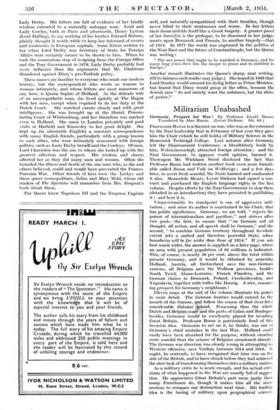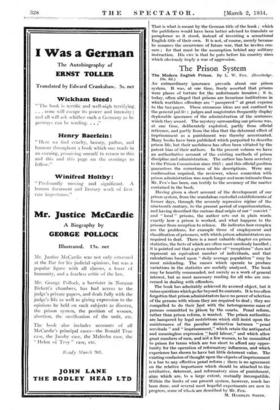Militarism Unabashed
PROFESSOR BANSE is a theorist on war, who was so far esteemed by the Nazi leadership that in February of last year they gave him the Chair (which he still holds) of Military Science in the Brunswick Technisd College. Last autumn after Germany _ left the Disarmament Conference, a bloodthirsty book by him, Wihrievissensch,aft, attracted foreign attention ; and the Nazi Government, to appease world opinion, banned it. Thereupon Mr. Wickham Steed disclosed the fact that Professor Banse had written another book even more formid- able called Raum and Volk im Weltkriege ; and a few days later, to avert fresh scandal, the Nazis banned and confiscated it also. Meanwhile Messrs. Lovat Dickson had signed a con- tract and purchased the English language rights in the last volume. Despite efforts by the Nazi Government to stop them (detailed in an introduction) they have persisted in publishing it ; and here it is.
Unquestionably its standpoint is one of aggressive mili- tarism ; and since its author is maintained in his Chair, that has public significance. Germany, we are told, " rejects the poison of internationalism and pacifism," and strives after two goals—the first, to ensure that " on German soil all thought, all action, and all speech shall be German," and the second, " to combine German territory throughout its whole extent into a unified and therefore powerful State, whose boundaries will be far wider than those of 1914." If you ask how much wider, the answer is supplied on a later page, where an area with present population of 92 millions is indicated. This, of course, is nearly 50 per cent. above the total within present Germany, and it would be obtained by annexing Holland, Austria, all Switzerland save the non-German cantons, all Belgium save the Walloon provinces, besides South Tyrol, Alsace-Lorraine, French Flanders, and the German claims in Denmark, Poland, Czechoslovakia, and Yugoslavia, together with trifles like Danzig. A nice, reassur- ing prospect for Germany's neighbours !
Eleven maps at the end of the volume illustrate his points in more detail. The German frontier would extend to the mouth of the Somme, arid- follow the course of that river for a colan
considerable distance d. Possessing thus the whole Dutch and Belgian .and the ports of Calais and Boulogne
besides, Germany would be excellently placed for invading : Great ..Britain. Professor Banse is particularly fond of this invasion idea. Omission to act on it, he thinks, was one of Germany's chief mistakes in the last War. Holland could easily have been absorbed for the purpose, without creating more scandal than the seizure of Belgium occasioned already. The German war direction was clearly wrong in attempting no Western offensive, save Verdun, between 1914 and 1918. It ought, he contends, to have recognized that time was on the side-of the British, and to have struck before they had achieved the slow task of transforming themselves into a military nation.
As a military critic he is acute enough, and his actual criti- cisms of what happened in the War are usually full of sugges- tion. He appreciates Great Britain's part more justly than many Frenchmen do, though it makes him all the more anxious to compass our destruction next time. His leading idea is the basing of military upon geographical science.
That is what is meant by the German title of the book ; which the publishers would have been better advised to translate or paraphrase as it stood, instead of inventing a sensational English title of their own. It is not, of course, merely because he assumes the occurrence of future war, that he invites cen- sure ; for that must be the assumption behind any military instruction. His vice is that he puts before his country aims which obviously imply a war of aggression.





























































 Previous page
Previous page